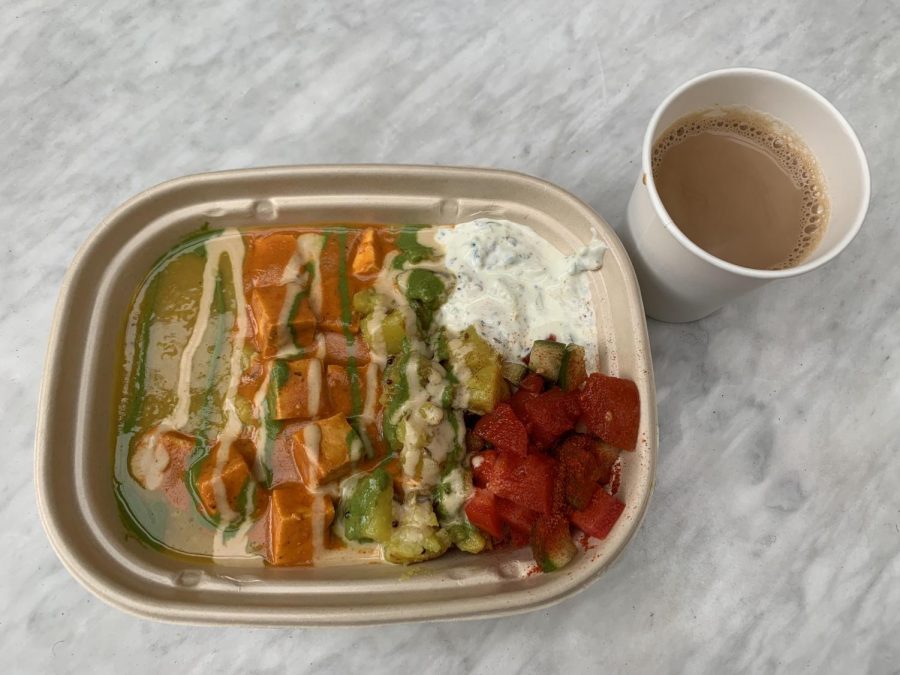Ambo’s Indian food balances authenticity and accessibility
The counter-serve restaurant on 55C East Eighth Street offers convenient, affordable and delicious Indian food to all.
Ambo, located on East Eighth Street, is a counter-serve Indian restaurant. Ambo opened in December 2019 and offers convenient, affordable, and delicious Indian food. (Staff Photo by Sabrina Choudhary)
September 13, 2021
As is the case for many college students living away from home, my comfort food is anything that resembles my family’s cooking. If I’m having a rough day, I’ll hit up the Kati Roll Company — or Masala Times or Taco Mahal — for a reminder of my dad’s chicken tikka masala or my grandmother’s mango lassis. I thought I’d exhausted every affordable Indian restaurant in the vicinity of Washington Square Park, but I was delighted to learn last week that another one-dollar-sign, fast-casual Indian restaurant resides in our midst: Ambo. When it caught my eye on Google Maps, I made a beeline from Bobst to East Eighth Street to find it there, shiny and new.
Well, new to me, anyway. Ambo opened in December 2019, mere months before the pandemic chased me off campus. The restaurant markets itself as “everyday Indian food,” both in terms of price (bowls start at $11) and nutrition (storefront signs laud its health benefits and vegan friendliness). The food is dependable, but what excited me most was the restaurant’s streamlined style and counter-service model. Every detail of Ambo’s design makes it attractive to a non-Desi consumer without compromising its authenticity.
The allure starts from the street. Now, East Eighth Street doesn’t have a ton of atmosphere, but Ambo has done a commendable job cultivating an aesthetic. Its bright orange outdoor seating area with lush plants shelters you from oncoming buses and jaywalking students. Its faux marble tabletops and neon signs are sleek. And the exterior is just a preview of the colorful food awaiting inside.
Ambo’s structure is akin to Chipotle; you start with a rice bowl base, and as you move down the line, you choose between several types of dal (lentils), proteins, vegetables and sauces. This encourages you to try a variety of dishes, which is great whether or not you’re familiar with them. I ordered paneer tikka masala over white rice with yellow dal, potatoes, kachumber (tomato and cucumber salad) and three different sauces (you get unlimited sauces!). The server drizzled the condiments in an elegant zigzag that accentuated the food’s beautiful colors.
It was far from the best Indian food I’ve had, but it got the job done. The potatoes were hearty, the paneer was rich, the kachumber was tangy and the combination was satisfying. My favorite component was the tikka masala because it’s my go-to dish and it was done well; the sauce was creamy and the spices warmed me up from the inside out.
As a bonus, Ambo is giving out a free cup of chai with every meal. Yes, you read that correctly! And it’s not the sugary Starbucks stuff either; you can taste the cardamom and the bitterness of the tea. My only complaint is that my rice got, well, a little lost in the sauce. A piece of naan or roti would have remedied that, but alas.
All of that said, the food itself is not why I’m invested in Ambo’s future. No, what makes Ambo noteworthy to me is that it sells quality Indian food without intimidating those who weren’t raised eating Indian cuisine. Ambo accomplishes what the Chipotle next door does not: balancing convenience with integrity.
You don’t have to know what these foods are to feel welcome here, but at the same time, nothing is whitewashed. For instance, the South Asian name of each dish is written on the glass with an English explanation underneath, which struck me as both genuine and inviting. A pillar at the end of the counter is painted with the English word “welcome” and translations underneath in what I believe are Hindi, Urdu and many other South Asian languages. Moreover, from what I could tell, only Desi people were working and eating there when I popped in, which I always read as a sign of authenticity.
Ambo demonstrates the distinction between authenticity and tradition. It’s innovative, yet its flavors are the same ones I grew up with. Like the invention of chicken tikka masala by 20th-century immigrants to the United Kingdom, Ambo represents another point in the evolution of a cuisine — and I’m hopeful that it’s a point of sharing and appreciation.
It’s satisfying to see the food I love and crave framed as desirable, contemporary and Instagrammable without compromising its native languages or flavors. It makes me optimistic that food from my culture will continue to become more accessible to wider markets without getting watered down in the process. That’s why Ambo’s tagline, “everyday Indian food,” is genius; it’s viable for anyone, any time.
And you know what? Even if it doesn’t change the world, $11 for a filling rice bowl just across from Cantor is still pretty exciting.
A version of this article appears in the Monday, September 13, 2021, e-print edition. Contact Sabrina Choudhary at [email protected].

























































































































































